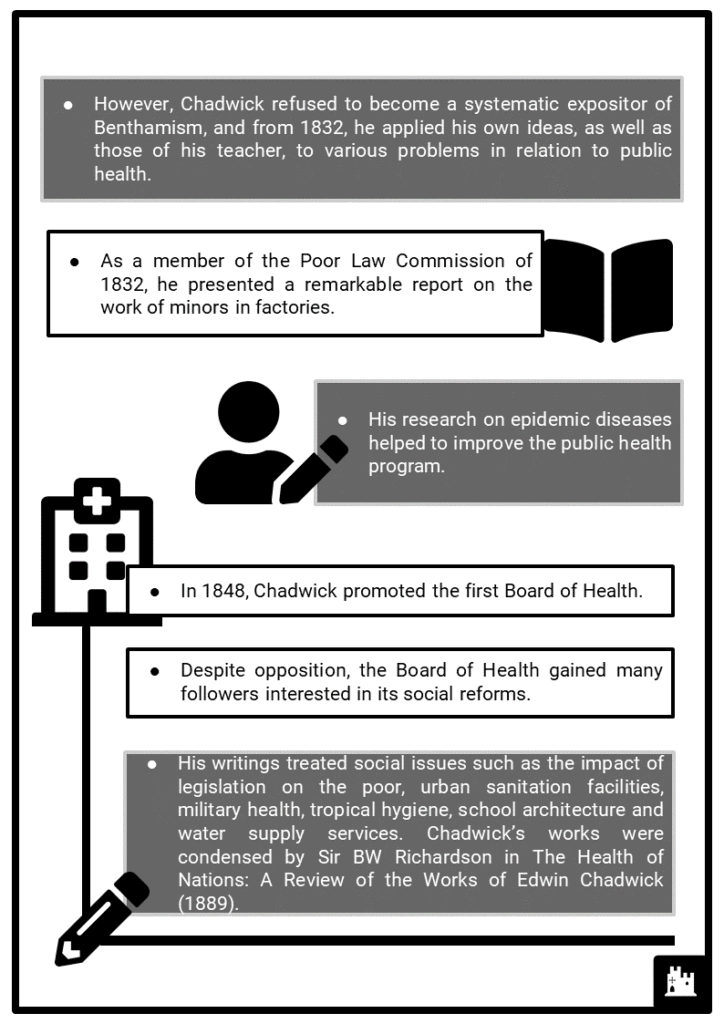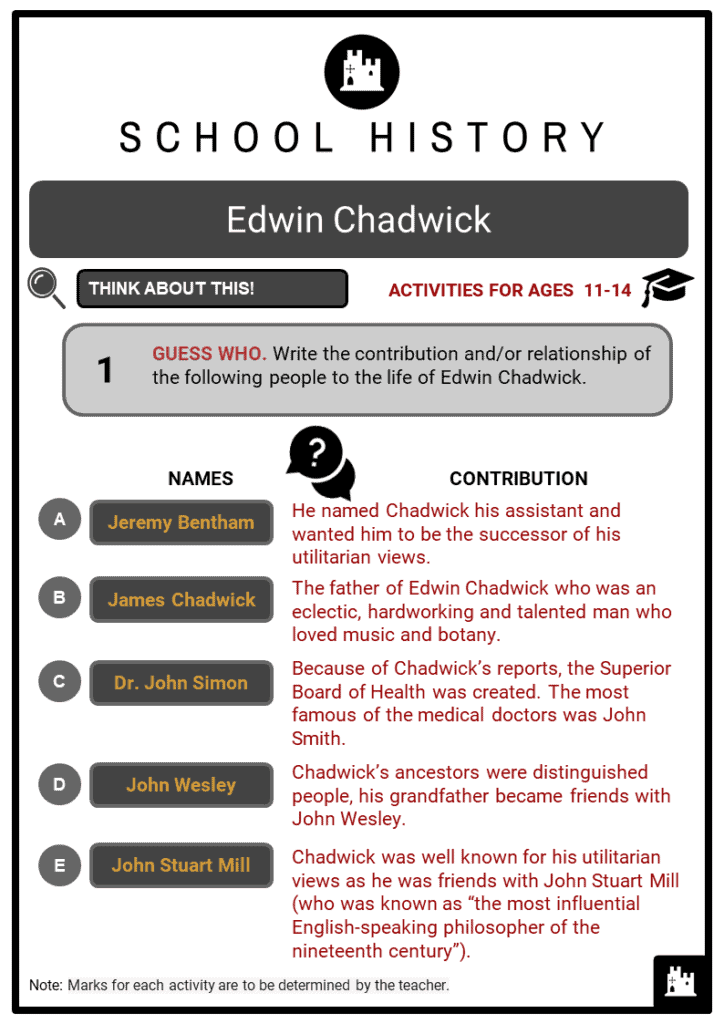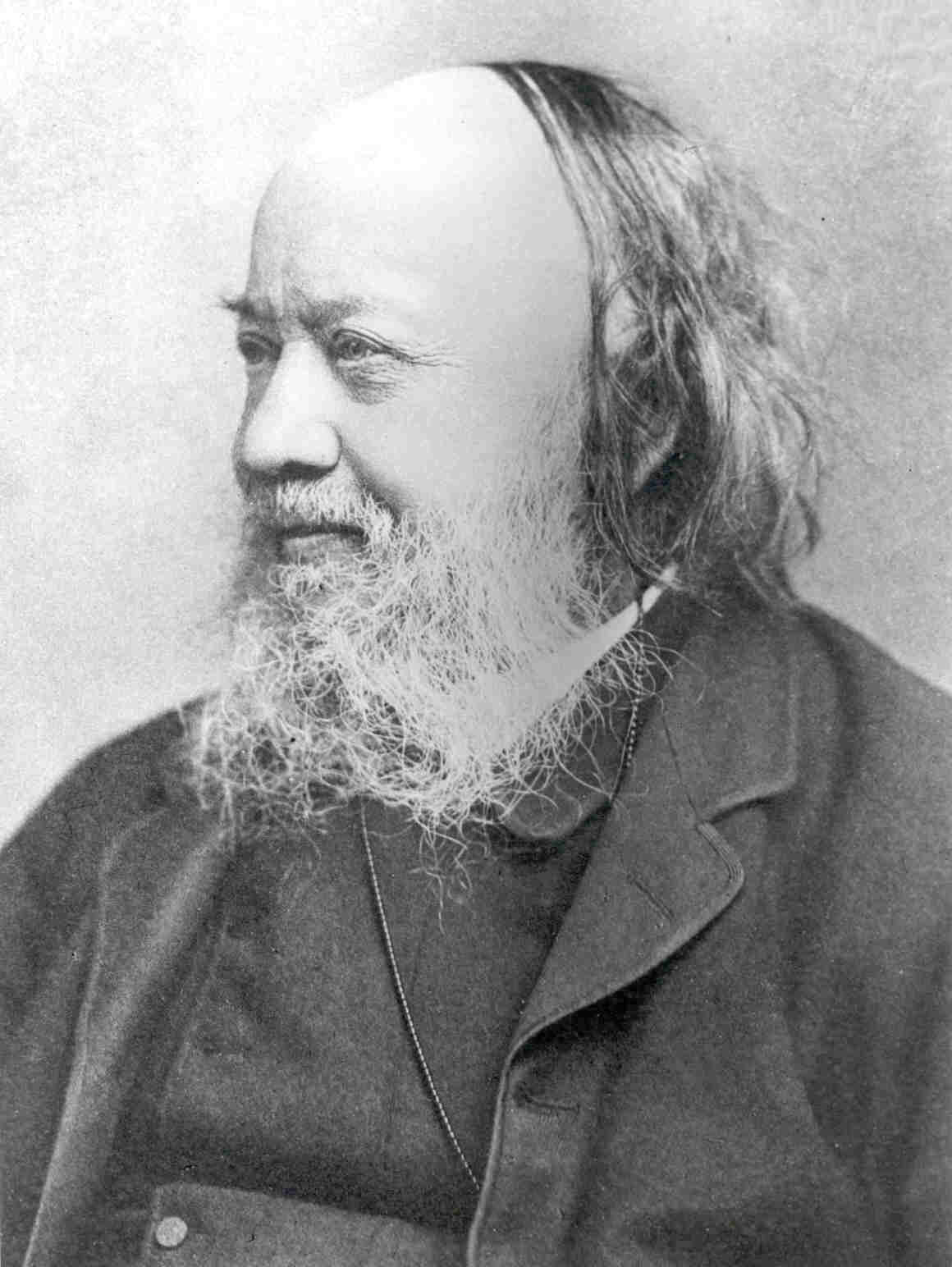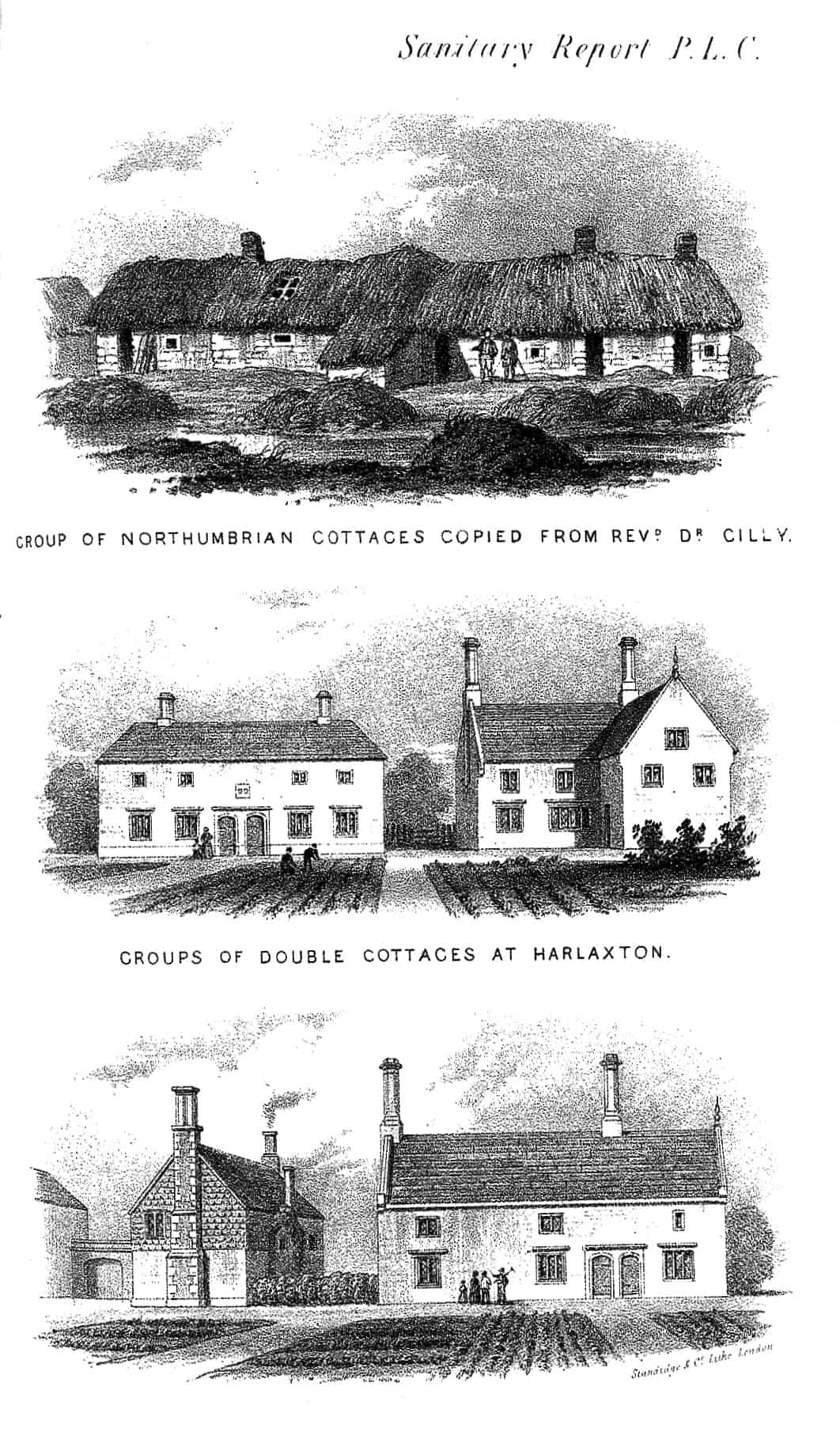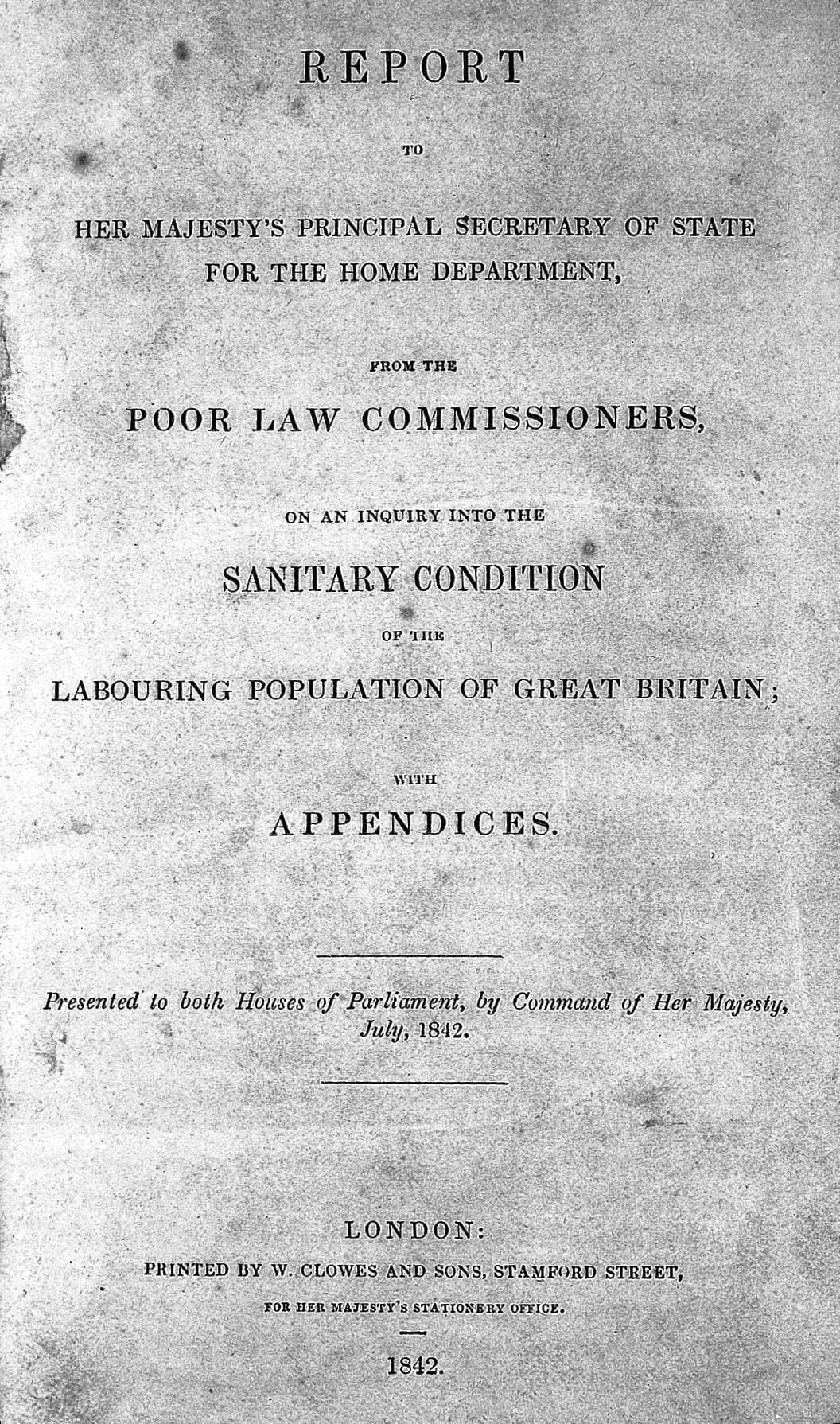Download Edwin Chadwick Worksheets
Do you want to save dozens of hours in time? Get your evenings and weekends back? Be able to teach Edwin Chadwick to your students?
Our worksheet bundle includes a fact file and printable worksheets and student activities. Perfect for both the classroom and homeschooling!
Table of Contents
Add a header to begin generating the table of contents
Summary
- Who was Edwin Chadwick?
- Edwin Chadwick’s prominent acquaintances and their achievements
- Edwin Chadwick’s greatest contribution
Key Facts And Information
Let’s find out more about Edwin Chadwick!
- Edwin Chadwick was an English sociologist born on the 24th January 1800 in Manchester.
- His essays on the application of scientific knowledge to government affairs caught the attention of Jeremy Bentham, who named him his literary assistant. However, Chadwick refused to become a systematic expositor of Benthamism, and from 1832, he applied his own ideas, as well as those of his teacher, to various problems in relation to public health.
- As a member of the Poor Law Commission of 1832, he presented a remarkable report on the work of minors in factories.
- His research on epidemic diseases helped to improve the public health program.
- In 1848, Chadwick promoted the first Board of Health.
- Despite opposition, the Board of Health gained many followers interested in its social reforms.
- His writings treated social issues such as the impact of legislation on the poor, urban sanitation facilities, military health, tropical hygiene, school architecture and water supply services. Chadwick’s works were condensed by Sir BW Richardson in The Health of Nations: A Review of the Works of Edwin Chadwick (1889).
Edwin Chadwick Biography
- Edwin Chadwick was born in Longsight (Manchester) in 1800, and died in 1890, in Surrey.
- His ancestors were distinguished people - his grandfather became friends with John Wesley, and his father, James Chadwick, was an eclectic, hardworking and talented man who loved music and botany.
- James Chadwick was also a close friend of some renowned liberal politicians of the time and towards the end of his life he worked as a journalist in New York, where he died at the age of 84.
- When Edwin Chadwick was very young, he moved to London with his father where he continued his education.
- During the first years of his career, Edwin Chadwick was a journalist and became the editor of several newspapers.
- As a young intellectual, Chadwick followed the same steps as his father and began studying law.
- However, he pursued such activity without abandoning journalism.
- Thanks to his studies and intellectual formation, Chadwick developed a precise ideology and wrote with great ease and care.
- His first articles did not go unnoticed and among those who read them with interest was Jeremy Bentham, who invited him to work with him.
- Subsequently, Bentham named him his assistant. Bentham wanted Chadwick to become his successor.
- In fact, when Bentham died a few years later, the young lawyer had already become one of his main disciples.
- However, although he shared Bentham’s utilitarian ideas, Edwin already had other plans for his career and was obsessed with the topic of health.
- Chadwick had discovered his passion for this topic whilst he was researching and writing an article on accidents.
- At that time, he was already well known, and one of his friends was John Stuart Mill.
- However, his acquaintances also included other distinguished thinkers.
- In 1832 he was asked to collaborate as a member of the Poor Law Commission.
- A year later, thanks to his meticulous and extensive work, Chadwick was recognised as commissioner-in-chief.
- From an administrative point of view, the law represented the first major attempt to standardise social policy in the whole of Great Britain.
- One of his many assignments was the study of children’s working conditions in factories.
Chadwick’s Efforts improved health conditions
- In the Commission, Chadwick demonstrated his characteristic laboriousness (in fact, he was addicted to working).
- He also proved his ability to plan, his organisational skills, his attention to detail, his integrity of principles, and above all, his determination to create and shape modern public health.
- However, notwithstanding his ethics, Chadwick earned many enemies and opponents due to his difficult nature. In fact, he was obsessed with his ideology, so much so that for some he was considered fanatical and stubborn.
- For others who knew him, he was considered arrogant, unemotional, and even boring. But even so, he managed to succeed thanks to his other qualities.
- In 1842, as secretary of the Commission, Chadwick coordinated the drafting of the Investigation Report on the health conditions of the working population of Great Britain.
- Chadwick financed the publication of such work.
- With a convincing tone, and with good statistical support, he detailed the impact of environmental deterioration on health in British cities.
- In this report, Chadwick placed emphasis on the formation of diseases as a result of poor hygiene conditions.
- His work thus reinforced the current theory according to which diseases were caused by the effluvia that arose from dirt, garbage, environmental contamination, as well as from the lack of potable water, and a sewage system that could eliminate excreta in an adequate manner.
- In France, only a few years earlier, Pasteur had given birth to the microbial theory, which had abruptly displaced the ideas stubbornly held by the defenders of the polluted environment.
- However, by that time, Chadwick had affirmed his opinions on health.
- During that time, Great Britain’s public health reforms were exclusively based on the environment and did not focus on society.
- In order to carry out his colossal task of reinforcing the reforms, Chadwick came into conflict with numerous individuals who wished to remain independent in the administration of health functions.
- Nevertheless, Chadwick was a firm believer in local participation, as long as it was supervised by a governing body from which the operating guidelines would emanate.
- Chadwick’s power was consolidated over time and his reports were the basis for the enactment of Britain’s first health law.
- The result of this legislation was the creation of the Superior Board of Health, which had power over the local health boards.
- These, in turn, could name medical officers, of whom the most famous was Dr. John Simon, who would later become the highest health authority in the United Kingdom.
- A few years later, Chadwick attempted to consolidate the civil service by presenting a law according to which all civil servants had to undergo examinations.
- His proposal was not taken into account until several years later.
- However, this does not mean that Chadwick was inactive. In fact, he participated in many other intellectual and political activities.
- A year before his death, he obtained official recognition for his extraordinary public services.
- The queen named him a knight and he received tributes from various European institutes.
Excerpts from the Poor Law Commissioners’ Report
- ‘[…] Various forms of epidemic, endemic, and other disease caused, or aggravated, or propagated chiefly amongst the labouring classes by atmospheric impurities produced by decomposing animal and vegetable substances, by damp and filth, and close and overcrowded dwellings prevail amongst the population in every part of the kingdom, whether dwelling in separate houses, in rural villages, in small towns, in the larger towns – as they have been found to prevail in the lowest districts of the metropolis.
- [..] Such disease, wherever its attacks are frequent, is always found in connexion with the physical circumstances above specified, and that where those circumstances are removed by drainage, proper cleansing, better ventilation, and other means of diminishing atmospheric impurity, the frequency and intensity of such disease is abated; and where the removal of the noxious agencies appears to be complete, such disease almost entirely disappears. […] The annual loss of life from filth and bad ventilation are greater than the loss from death or wounds in any wars in which the country has been engaged in modern times. […] Of the 43,000 cases of widowhood, and 112,000 cases of destitute orphanage relieved from the poor rates in England and Wales alone, it appears that the greatest proportion of deaths of the heads of families occurred from the above specified and other removable causes; that their ages were under 45 years; that is to say, 13 years below the natural probabilities of life as shown by the experience of the whole population of Sweden. […] the removal of noxious physical circumstances, and the promotion of civic, household, and personal cleanliness, are necessary to the improvement of the moral condition of the population; for that sound morality and refinement in manners and health are not long found co-existent with filthy habits amongst any class of the community’ (Chadwick 1842).
Chadwick’s Personality
- Chadwick had a very difficult and domineering character.
- Chadwick was familiar with the Ricardian political economy, he was one of J.S. Mill’s friends, a prominent member of the Political Economy Club, and the personal secretary of the utilitarian philosopher Jeremy Bentham between 1831 and 1832.
- Nonetheless, he was viewed as a tireless worker, and he actively participated in the design of English public law that attempted to relieve and improve poor people’s living situations, work conditions within in factories, public health, education, and criminal behaviour.
- Chadwick was especially influenced by Bentham’s theory of legislation.
- Overall, it can be stated that Chadwick’s influence over British economic and social policy was far-reaching, since he took part (directly or indirectly) in many projects between 1830 and 1890.
Image sources:
[1.] https://upload.wikimedia.org/wikipedia/commons/9/9e/SirEdwinChadwick.jpg


